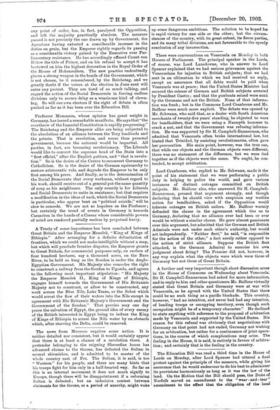There were conversations on Venezuela on Monday in both Houses
of Parliament. The principal speaker in the Lords, of course, was Lord Lansdowne, who in answer to Lord Spencer explained that we had serious grievances against the Venezuelans for injustice to British subjects; that we had sent in an ultimatum to which we had received no reply, except an assurance that all debts would be paid whet), Venezuela was at peace ; that the United States Minister had secured the release of German and British subjects arrested by President Castro ; and that the gunboats seized were sunk by the Germans and not the British. None of that informa- tion was fresh ; but in the Commons Lord Cranborne and Mr. Balfour were much more explicit. The debate was opened by Mr. Schwann, who said that, as a dealer with South American merchants of twenty-five years' standing, he objected to wars for bondholders, that we were using a Nasmyth hammer to crack a nut, and that the Government was refusing informa- tion. He was supported by Sir H. Campbell-Bannerman, who admitted that Venezuela often broke international law, but hinted that Trinidad, by assisting revolutionaries, often gave her provocation. His main point, however, was the true one, that while our objects and the German objects were different, there was no statement of the difference, but we were tied together as if the objects were the same. We ought, he con- tended, to accept arbitration.










































 Previous page
Previous page